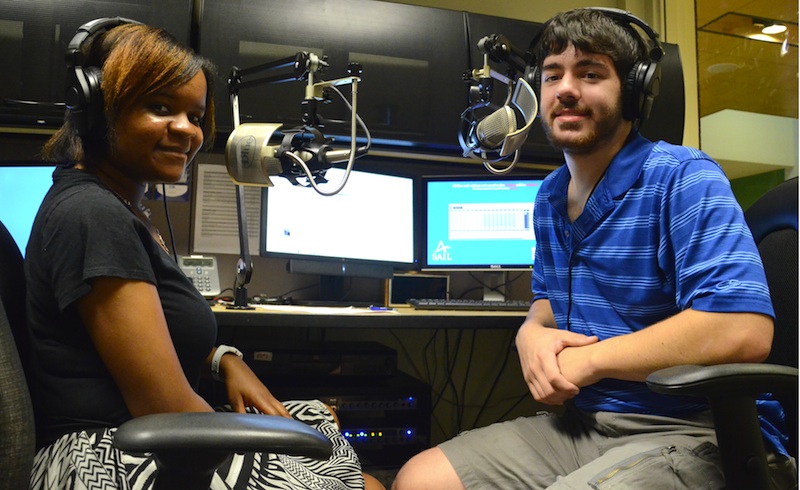The Blue Echo’s small office on the bottom floor of UNCA’s student union features two big glass windows, four computers, a pair of microphones and a soundboard. But despite the decal on the glass and the blue lights strung around a window frame, most students walk right by the school’s only Internet radio station.
It’s about 11:30 a.m. and, according to the agenda scrawled on the whiteboard, no one’s scheduled to be on the air. Two years ago, however, no one was on the air, period; that was the station’s most recent hiatus but not the first. The Blue Echo had taken a similar break in 2005.
You can chalk that spotty history up to a lack of commitment, says Rick Brophy the station’s faculty adviser since its inception 10 years ago. “You can sit down and spin all the tunes you want for an hour. But if you’re doing it 10 times a week, 16 weeks a semester, it starts adding up,” he explains.
For almost every hour of on-air content, there’s at least an hour of off-air planning for each of the Blue Echo’s 15 weekly shows, Station Manager Drew Proctor estimates. But hatching a plan to attract a consistent audience has proved to be perhaps the most challenging task of all.
These days, thanks to online radio stations like Pandora and apps like Spotify, anyone can be their own disc jockey, creating and sharing playlists.
“When we started the Blue Echo, Pandora and all of the other online services weren’t out there. Well, that’s taken a lot of audience,” notes Brophy.
Turbulent times
Proctor, meanwhile, says those services have changed the way he thinks about the station’s programming. “We’re switching toward more talk shows and talk-oriented shows, because we’ve seen that the numbers are higher. Basically we’re asking ourselves what can we offer our listeners that Pandora doesn’t,” he reveals. “We had to really talk about what we wanted to be.”
A 2011 study by Edison Research showed a growing interest in online radio. Of the 1,505 Americans interviewed in July of that year, one-third said they’d listened to streaming AM/FM stations, Internet-only services like Pandora, or both in the previous month. And according to this year’s State of the News Media study conducted by the Pew Research Center’s Project for Excellence in Journalism, Americans who listened to online radio last year did so for an average of 9 minutes, 47 seconds — compared with an estimated 6 minutes, 13 seconds in 2008.
And to Asia Sheppard the Blue Echo’s programming director, that spells opportunity.
“You have to bring something new to the table and engage your audience to get an audience,” says Sheppard, a former station DJ. “We don’t just want to play music that we like: That’s not what radio’s about at all. We want to give our campus a voice.”
But how you do that inevitably leads to money questions. Around the time the Blue Echo started up, someone else on campus was trying to start a low-power-FM station. Equipping and running such a station would have been a lot more expensive, and even though the Federal Communications Commission accepted UNCA’s application, Brophy says it just wasn’t worth it in the end.
“At 10 watts, you could only hear it on campus, and we would have to share it with a local community station. That whole idea fell off, but at the same time, that was when people started streaming,” he explains.
Funded through the university, the Blue Echo has a budget of a couple of thousand dollars per year; Proctor says a show is doingi well when 20 people tune in at once.
Brophy attributes those low numbers to the station’s unstable history and the resulting attitudes. “Because of the tumultuous times and the things that went downhill, people stopped listening, stopped paying attention and thought, ‘Blue Echo is a joke,’” Brophy recalls.
And though he, Proctor and Sheppard all say they think college radio is dying, that won’t stop them from trying to keep the Blue Echo alive.
“You can get your music anywhere, and I think college radio stations need to figure out why their students should listen to them,” notes Brophy. “We need to find our niche on this campus, and I think that’s what college radio has to do.”
This story is the first in a new series called “Pressing Matters.” In it, Xpress will explore changes, news and trends in the media industry and, more importantly, what it all means for Western North Carolina.




Before you comment
The comments section is here to provide a platform for civil dialogue on the issues we face together as a local community. Xpress is committed to offering this platform for all voices, but when the tone of the discussion gets nasty or strays off topic, we believe many people choose not to participate. Xpress editors are determined to moderate comments to ensure a constructive interchange is maintained. All comments judged not to be in keeping with the spirit of civil discourse will be removed and repeat violators will be banned. See here for our terms of service. Thank you for being part of this effort to promote respectful discussion.